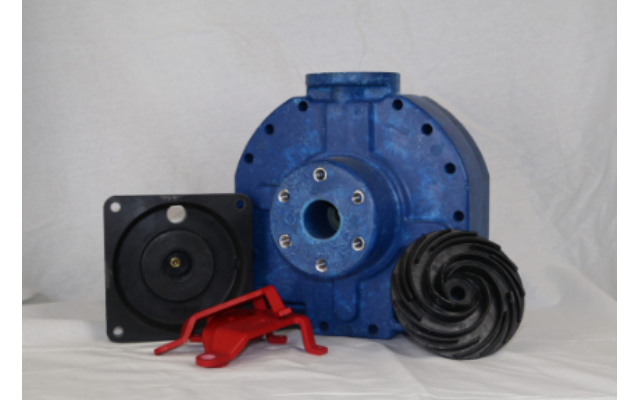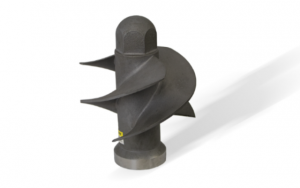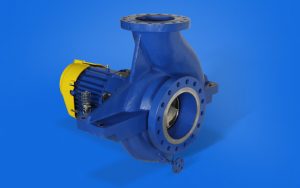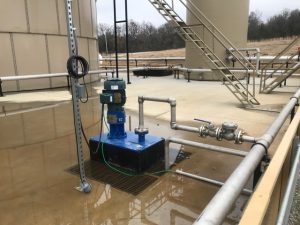Author: Carver Pump
Selecting the right material contributes to the successful operation of a pump in a custom application. If the pump is not engineered with operation in mind, the components will not last to customer expectations. Service longevity, operational costs, maintenance, and repairs factor into the actual cost of a pump over the course of its lifetime. So why not consider the materials with which your pump is constructed?
Pumps have been manufactured from many types of materials for decades. One of the most expensive materials used is titanium, and while it comes at a higher cost, it offers superior anti-corrosive benefits. For example, titanium is typically used in pumps operating in corrosive chemical applications. However, the expense of titanium can deter customers due to the high material costs. Composites offer more alternatives than ever before.
Composite plastics can perform with superiority in some cases at significantly reduced costs, and can be reinforced with materials such as fiberglass, carbon fiber, or Kevlar for added benefits.
Composites became known to industry in the 1960s during the development of equipment for the moon landing in 1972. They were used in the space shuttle, which allowed it to be stronger and lighter in weight. The engineers at Carver Pump work with many different industries and have engineered pumps with steel, titanium, thermoset plastic, and composites. Several determining factors play a role in material selection.
An impeller made from titanium can be significantly more expensive than one made from composites based solely on the material cost. The weight of titanium and composites are similar and the anti-corrosive properties can be equivalent in some applications. If lower cost is a priority, the use of a thermoset option might be considered. Pumps used in seawater may have a titanium pump casing and a composite impeller. This combination can offer a lower cost impeller with the same or similar anti-corrosive properties.
Cost and delivery often determines the pump component materials selected. Foundries can take as long as 12 to 14 weeks or longer to make a metal casting. We manufacture in the USA and can make composite components in as little as two weeks – once the mold has been made. Molds are generally made of aluminum or steel with compression, injection, and resin transfer molding done at our facility in Iowa.
 What You Should Know About Composites
What You Should Know About Composites
The strength to weight ratio in composites can be equivalent to some grades of aluminum. While composites have great capabilities, not everything made from steel or aluminum can be made in the same shape with composites. The part design is a crucial factor. In a composite, the shape must be modified to best fit the properties and characteristics of the plastic. The resulting shape is frequently equivalent or greater in strength based on part geometry changes. The molding process allows for combining previously welded and bolted parts into a single shape, resulting in a huge cost savings.
Do Composite parts last as long as metal parts?
Metal pump parts such as casings and impellers can last from months to years depending on the corrosive nature of the liquids being pumped. Our composite impellers when used in clean seawater applications can last indefinitely. They are designed to last 50 years, (with regular inspection) in our Naval applications. Composite impellers are not subject to galvanic corrosion and can benefit ship design by allowing metals in neighboring pumps. We have found that our composite impellers have nearly an unlimited lifespan when inspections are performed regularly.
Examples of Composite Component Pumps
Carver offers a multistage pump that uses a wear resistant composite material for a bushing that has worked well in the field for many years. Hardened metal was used in the construction previously, but the composite part is more durable and outlasts the metal.
We also make composite pump impellers for the Department of Defense because of the anti-corrosive properties. The lightweight impellers enable a single person to service the pump.
We are proud to say that Carver Pump is one of the leading pump suppliers to the US Navy and has been providing centrifugal pumps since World War II. Carver pumps are installed on all current shipbuilding programs (i.e., Ford Carriers, Zumwalt Destroyers, Aegis Destroyers, Littoral Combat Ships, America Big Deck Amphibious Assault Ships, San Antonio Amphibious Transport Docks and Virginia Submarines).
To learn more about composite materials, click here.
About Carver Pump
Since we built our first pumps in 1938, Carver Pump has become recognized as one of the leading centrifugal pump companies, building pumps to the most demanding engineering specifications and military standards in the world. We were one of the first American pump companies to attain ISO 9001 certification – the most recognized standard for quality in the world. This certification is your assurance that our commitment to quality includes not only our hardware, but also superior customer service, leading-edge R&D, and continuous improvement in everything we do. So whether the job is refueling fighter jets on the deck of an aircraft carrier, supplying paint to an auto assembly line, or bringing water to the fountain in a city park, we put our reputation on the line everyday with every pump we build. Learn more at www.carverpump.com.




